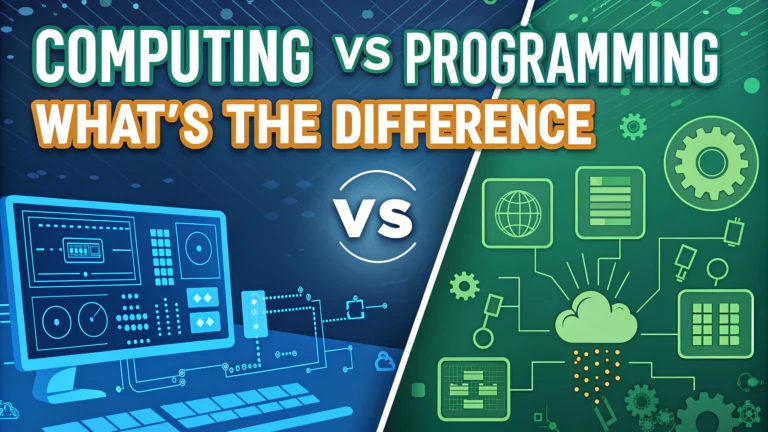Many people mix up computing and programming, but these fields have distinct roles and purposes. While programming focuses on writing code to create software, computing encompasses a broader scope that includes hardware, theory, and system design.
The boundaries between computing and programming continue to evolve as technology advances. Learning the key differences helps students and professionals make informed career choices and understand how these fields complement each other.
Core Concepts of Computing Science
- **Theoretical foundations**: Algorithms, data structures, and computational theory
- **Hardware architecture**: Computer organization and system design
- **Information systems**: Database management and networking
- **Operating systems**: Resource management and system software
Programming Fundamentals and Skills
- **Code writing**: Syntax, debugging, and testing
- **Language proficiency**: Understanding different programming languages
- **Software development**: Creating applications and programs
- **Version control**: Managing code changes and collaboration
Key Differences and Career Paths
| Computing | Programming |
|---|---|
| Focuses on theory and concepts | Emphasizes practical implementation |
| Broader scope of study | Specific technical skills |
| System architecture roles | Software development roles |
> “Computing is about understanding the principles, while programming is about applying them through code.” – Academic perspective
Essential Tools and Development Environments
Modern computing and programming rely on specific tools that enhance productivity and efficiency. **IDEs** like Visual Studio Code and Eclipse provide integrated development environments for programmers, while computing professionals use tools like **system analyzers** and **network monitors**.
- **Development tools**: Git, Docker, Jenkins
- **Computing tools**: Wireshark, MATLAB, VMware
- **Cloud platforms**: AWS, Azure, Google Cloud
Real-world Applications and Industry Impact
Computing and programming shape different sectors through specialized applications. **Healthcare** uses computing for medical imaging and data analysis, while programmers create patient management systems. **Financial institutions** rely on computing for risk assessment and programmers develop trading platforms.
| Industry | Computing Role | Programming Role |
|---|---|---|
| Manufacturing | Process optimization | Automation software |
| Education | Learning analytics | Educational apps |
Building Your Skills and Knowledge
Start with foundational concepts before specializing in either field. Take online courses through platforms like **Coursera** or **edX** for computing theory. Practice programming through **coding bootcamps** or **project-based learning**.
> “Success in either field requires continuous learning and adaptation to new technologies” – Industry expert
- Join tech communities and forums
- Build a portfolio of projects
- Attend workshops and conferences
- Follow industry blogs and publications
Growth and Career Opportunities
The tech industry continues to expand, creating diverse roles in both computing and programming. **Cloud computing** and **artificial intelligence** drive demand for computing expertise, while **mobile development** and **web applications** need skilled programmers.
Career prospects:
1. Computing roles: System architects, Data scientists, Network engineers
2. Programming roles: Full-stack developers, Mobile app developers, DevOps engineers
3. Hybrid roles: Solutions architects, Technical consultants
**Salary ranges** and job satisfaction remain high in both fields, with opportunities for remote work and flexible schedules becoming increasingly common.
Computing vs Programming FAQs
General FAQs
Q: What is the main difference between computing and programming?
A: Computing is the broad field encompassing all aspects of computer systems, data processing, and information technology. Programming is a specific subset focusing on writing code to create software applications.
Q: Can you work in computing without being a programmer?
A: Yes. Many computing roles don’t require programming skills, including:
- IT Support
- System Administration
- Network Engineering
- Project Management
- UX Design
Career-Related FAQs
Q: Which pays more: computing or programming jobs?
A: Salary ranges often overlap, but specialized programming roles like Software Architects and Senior Developers typically earn higher salaries than general computing positions.
Q: What degree is better for future job prospects: Computer Science or Programming?
A: A Computer Science degree typically offers broader career opportunities as it covers both programming and computing fundamentals. Pure programming degrees are less common but can be suitable for specialized development roles.
Skill-Based FAQs
Q: What skills do I need for a computing career vs programming career?
| Computing Skills | Programming Skills |
|---|---|
|
• System Analysis • Network Knowledge • Hardware Understanding • Problem Solving |
• Coding Languages • Algorithms • Software Design • Debugging |
Q: Is mathematics more important for computing or programming?
A: Advanced mathematics is generally more crucial for programming, especially in areas like algorithms and game development. Basic computing roles typically require less mathematical expertise.
Q: How long does it take to learn programming vs computing basics?
A: Basic programming skills can be learned in 3-6 months, while computing fundamentals typically take 1-2 years to master through formal education or experience.
Technical FAQs
Q: What tools are used in computing vs programming?
A: Computing tools include network analyzers, system monitoring software, and hardware diagnostic tools. Programming tools focus on IDEs, version control systems, and debugging software.
Q: Can artificial intelligence replace computing or programming jobs?
A: AI can automate certain aspects of both fields but is more likely to augment rather than replace human workers. Complex problem-solving and creative development still require human expertise.
Q: What’s the role of cloud computing in programming?
A: Cloud computing provides platforms and infrastructure for programming, enabling developers to build, test, and deploy applications more efficiently through services like AWS, Azure, and Google Cloud.
Q: How do computing and programming work together in cybersecurity?
A: Computing provides the infrastructure and system knowledge while programming enables the creation of security tools, encryption systems, and protective software measures.



















